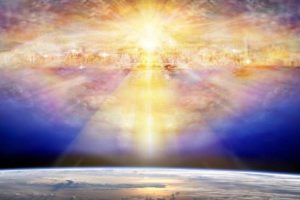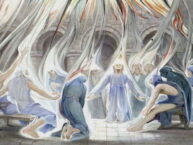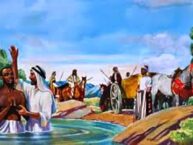[Our guest preacher was Mr. Christopher Dwyer. Christopher is a chorister, co-chair of our Outreach Group, and a seminarian] November 25, 2018: May the words of my mouth and the meditations of our hearts be acceptable in Thy sight, O LORD, our strength and our redeemer.
Amen.
The book of Revelation, which we heard from in today’s second reading, is also known as the Apocalypse. The ending few chapters of Daniel, which was today’s first reading, are in a style of literature called “Apocalyptic.” Apocalypse is kind of a loaded word, but it really just means ‘the end of the world.’ In Judaism, Christianity, and Islam, specifically, apocalyptic scriptures describe ‘end times’ in which God takes vengeance on the earth on behalf of God’s people. For instance, later on in Revelation we hear chapter after chapter of cosmic warfare and divine wrath, followed by the “Thousand Years,” after which those whose names are not written into the “Book of Life” will perish, and not live to see the “New Heaven” and “New Earth” God creates in its place. The apocalyptic section of Daniel, which was written centuries after the more narrative bits that contain stories like Shadrach, Meshach, and Abednego, tell tales of the tumultuous happenings in the ancient Mediterranean world over the last few centuries before the common era, as Babylonians and Persians and Greeks and Romans all fight for supremacy, ultimately ending in a cosmic victory for the angel Michael, and the people will be delivered.
The secular world has several of its own apocalyptic stories, some more fantastic than others. There’s the nuclear holocaust, which, for those of us who were around for the Cold War, never really seemed all that far-fetched. Then there’s my personal favorite, from The Hitchhiker’s Guide to the Galaxy, where Earth is casually destroyed via eminent domain to make way for a new hyperspace freeway construction project.
But of late, and especially in this decade, the apocalypse that we hear of most often in popular culture is zombies. The individual stories have their differences, but it usually goes something like this: A pandemic rapidly descends on humanity. The illness causes people, within a few days of infection, to become mindless, soulless husks, undaunted by physical damage and unable to feel pain, swarming in hordes, and driven by an insatiable urge to infect still others with a bite or a scratch. Within a few months of the first outbreak society collapses, and survivors are on their own, trying to survive as long as they can without becoming infected themselves.
In the Hebrew and early Christ-follower writings, apocalypses come with happy endings. Yes, the world might have been wiped out, but God came in and made all things new, the way that God does, wiping “away all tears from their eyes; and there shall be no more death, neither sorrow, nor crying, neither shall there be any more pain: for the former things are passed away.” (Rev. 21:4). The secular myths don’t have this. I mean, I know the source material is still being written, but nothing about The Walking Dead so far suggests to me that either a New Heaven or a New Earth is in the mix for the final season.
So, if it’s all so bleak, why do we want it? Why are there t-shirts for sale cheering on a coming zombie apocalypse. Why did the CDC (the actual CDC, for any Walking Dead fans) release a zombie apocalypse survival guide? Why does no less a cultural barometer than Buzzfeed have several dozen articles and quizzes under the tag “Zombie Apocalypse?”
In my opinion, it is the societal collapse that seems to have best captured our collective imagination. And why not? Society has failed us. Society has healthcare corporations setting fundraising minimums for patients before they can even be looked at for surgeries. Society has locked away over 14,000 children because their parents sent them across a border. And society still cannot put a grocery store in a poor neighborhood or put clean water into Flint, Michigan, three years after the EPA noticed lead contamination. Fixing all this piecemeal has proven difficult. There’s a lot of money to be made by perpetuating societal ills, and people don’t just let money like that go easily. So, what if the whole thing just blew up – all of it? What would our world look like if we completely did away with civilization, and all of a sudden there were no traffic lights, no grocery stores, no schools,
No copayments. No credit reports. No student loan balances…
You see, that’s what a successful end-times myth does. It makes us imagine a better world than the one we have now. Turns out that for a sizeable portion of the population, a world better than the one we live in today could potentially involve zombies.
Now, I have nothing against a good thriller, but personally, while a world without student loan balances definitely has its appeal, I prefer the New Heaven and New Earth to the rampaging hordes of zombies, but I’m just a sucker for a happy ending like that.
Jesus likes a happy ending, too.
In today’s Gospel reading, Pilate and Jesus are having a discussion. Jesus knows full well who he’s talking to, and he has no delusions that anything he says in that achingly classical dialogue could get him out of crucifixion. Once he leaves Pilates headquarters, he will spend the next several hours – the last of his earthly life – in unfathomable agony. His friends have deserted him, his nation has trumped up charges against him, he is at his lowest.
And in the middle of that, Pilate asks him if he’s a king, because that’s what the real charge was. If Jesus had said he was, well, that’s an insurrection, and that’s what Pilate was trying to figure out – was there going to be an army of Jesus’s followers coming down from Galilee to rescue him. But Jesus looked him dead in his eye and talked about heaven. In the three Synoptic Gospels – Matthew, Mark, and Luke – we hear lots of parables of “The Kingdom of God is like a mustard seed, or a treasure in a field,” and the like. In John, we only hear about this kingdom twice. First, when Jesus is talking with Nicodemus in Chapter 3. And secondly, right here, when Jesus answers Pilate’s question with “My kingdom is not of this world.”
With that answer, Jesus is staring down death and saying, “Is that all you got?” Because he’s lived under the thumb of Roman oppression for 33 years, and he knows who he’s up against. As the father of black liberation theology James Cone wrote: “If we really believe that death is not the last word, then we can fight, risking death for human freedom, knowing that the ultimate destiny of humankind is in the hands of the God who has called us into being.”[i]
For enslaved Africans in the United States, heaven became a similarly subversive image in their sacred songs. Many spirituals speak of a promised land, a land of justice, a land where they would no longer be in bondage, and in this imagery, the enslaved person might find themselves a moment’s peace, knowing that something better was waiting for them. But, more than that, this promised land was a place of collectivejustice, collectivefreedom. They weren’t singing “I am climbing Jacob’s ladder,” they were singing “weare climbing Jacob’s ladder.” And of heaven they sang, “If you get there before I do – tell all my friends I’m coming after you.” It’s a place they would see together, would work towards together, and would help others find. The Kingdom of God is like that, too.
But that moment’s peace can really only be that, because if we relegate this Kingdom to popular views of a far-off heavenly afterlife, with harps and choirs of angels and the like, we’ve missed the point. As womanist theologian Karen Baker-Fletcher wrote: “The ‘hereafter’ or eternity is not only in the future, but it is in the past… It is indeed a fullness of time in which past, present, and future coexist together.”[ii]So, in order to live into this Kingdom of God, we need to get right with what’s here with us now. If we don’t do that, and we wait on some clouds and pearly gates to make everything alright, we’re walking right into the hands of the enemy. You see, slavers in the United States had no problem teaching those they enslaved about Christianity, so long as it was theirChristianity. And in their Christianity, heaven was a place where you went if you were good on earth, and they appointed themselves arbiters of what was good. But if we ensure that our communities and our loved ones and all of God’s creation are fed, clothed, healthy, loved, housed, and safe, and if we work with each other and love each other enough to make that happen, then God’s kingdom will come on earth – in the here and now – as it already has in heaven, in the hereafter.
That has kind of a ring to it, doesn’t it? And isn’t that the point? That when we pray as Jesus taught us to pray, we can change the world.
Apocalypse writings like the last six chapters of Daniel and the book of Revelation were written during frightening times, when the Jewish people were in turmoil, their traditions being flouted by the very people who were supposed to preserve them, their independence either in question or long-since gone, and, at least in Revelation, their lives at risk. They needed to remember that the Hasmoneans weren’t in charge, that Rome wasn’t in charge, but that God was in charge, and that if they were God’s people, God would see them through.
This may not have the allure of a zombie flick. But I think you’ll like the ending.
Amen.
For the audio from the 10:30am service, click below, or subscribe to our iTunes Sermon Podcast by clicking here:

[i]James H. Cone, A Black Theology of Liberation, 40th anniversary ed (Maryknoll, N.Y: Orbis Books, 2010), 150.
[ii]Karen Baker-Fletcher and Garth Baker-Fletcher, My Sister, My Brother: Womanist and Xodus God-Talk (Maryknoll, NY: Orbis, 1997), 286, as quoted in Eboni Marshall Turman, “Moving Heaven and Earth: A Womanist Dogmatics of Black Dance as Basileia,” 2014, 122, https://doi.org/10.7916/d8rn3764.






